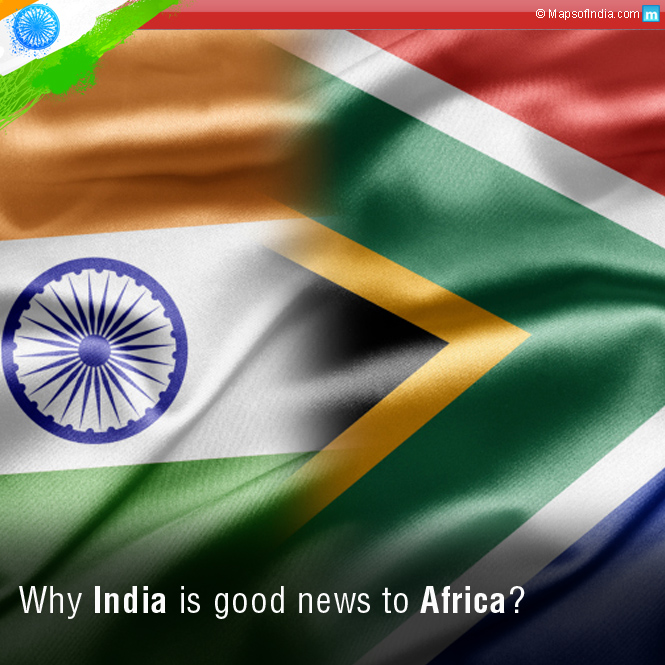India and South Africa share a unique relationship – a relationship that was forged by Mohandas Karamchand Gandhi, who initiated the Satyagraha movement in the country some hundred years ago. India had consistently supported the anti-apartheid movement in South Africa and was the first country to sever diplomatic and commercial ties with its apartheid government that was existent in South Africa in the year 1946. It was only in 1993 that relationship between both the countries returned back to normalcy. Since then, the relationship has only grown – steadily and progressively – politically and commercially. In that light, India has always been a good business ally of South Africa.
A look at the trade between India and Africa
The bilateral trade between India and Africa, as a whole, has grown by about 32 per cent in the period between 2005 and 2011. From USD 24.98 billion in 2006-7, the trade has managed to touch USD 53.33 billion in 2010-11, notwithstanding the economic crisis that the world reeled under in the late 2000’s. The trade is expected to go up to USD 70 billion by 2015.
The success can be attributed to both India and Africa. The Indian private sector has gone all out to create business opportunities in Africa, and Africa, in turn, has been very receptive to the initiatives. India has been engaging with African countries at the political, economic and development levels.
The Indian industry bodies have also been playing a key role. They have been fostering public private partnerships and joint ventures by bringing together government, public and private institutions on a common platform. For instance, the Confederation of Indian Industries (CII) in association with EXIM Bank has been organising Indo-Africa Partnership Conclaves since 2005. These conclaves have been very successful and have grown in magnitude over the years. Another instance is that the EXIM bank has been facilitating Indian companies to do business in Africa by offering Line of Credit at concessional rates to institutions in Africa to support financing of the projects.
India has been investing heavily in Africa and is believed to have made an investment of over USD 32 billion till date. Indian companies have made a foray into various sectors in Africa – right from telecommunications to IT enabled services to energy to mining.
The agents of change
Both the governments have been playing key roles in supporting bilateral trade. Also, adding to the growth are the India-South Africa Joint Ministerial Committee, the BRICS group, and India Brazil South Africa Forum.
India has been South Africa’s top trading partner and is currently the fifth biggest export destination and sixth largest country from where Africa makes its imports. India buys platinum, gold, diamond, chemical products, and machines from South Africa, making these items a major portion of the country’s exports. Similarly, South Africa imports manufactured goods like electrical machinery, phones, pharmaceuticals, which have also grown up by 28 percent in the past five years. In 2011-12, the trade amounted to USD 14 billion, a clear indication that it will surpass the trade target of USD 15 billion in 2014-15 set in 2010.
Over the past decade, many multinational enterprises from South Africa have ventured into India in the insurance, financial, infrastructure and breweries sectors. India has been making huge investments in South Africa. Companies like Mahindra and Mahindra, Reliance Communications, TATA, Ranbaxy, Cipla and the UB group have been heavily investing in South Africa. The estimated investments is said to be to the tune of USD 6 billion.
In the banking sector, Bank of India (BOI) was the first Indian bank to open its branch in South Africa in Johannesburg in 2010. Looking at further enhancing trade between both the countries, the bank plans to focus on developing small and mid-sized enterprises and corporate banking.
Meanwhile, South Africa has also been investing in India. Companies like SABMiller, a brewery company; Sanlam and Old Mutual, an insurance firm; Adcock Ingram, a pharmaceutical company; the Airports Company South Africa; the Rand Merchant Bank are among the forerunners when it comes to investing in India. South Africa may have invested to the tune of USD 250 million in India.
The way forward for India and Africa
A study was undertaken by the CII in association with World Trade Organisation to gauge the areas of improvement so as to facilitate further trade between India and Africa. Some 60 Indian and African business associations took part in the survey. The findings revealed that the there are many factors that are posing hindrance to the growing trade between India and Africa. The main concern being that Africa is unable to access Indian buyers and trade finances easily, while India faces transport and logistics issues and a poor business environment.
The study recommends that Indo-African trade will receive a boost if the trade basket includes more items, especially when it comes to exports from Africa. And that India and Africa must also look at better trade facilitation and together overcome the hurdles of shipment and other logistic issues. To tackle these issues, India and Africa can begin by participating in dedicated trade meets pertaining to specific sectors. This may help resolve the issue, the study recommends.
The export of African services can be diversified too. For instance, tourism in Africa holds an immense export potential in India if it is able to tap the growing tourism market in India. Another factor that will aid trade is the lowering of the transaction costs incurred during exports by both the countries. For instance, when it comes to exporting services from India to South Africa, India always experiences a poor business environment and faces several issues in obtaining visas and work permits. If this is addressed, the bilateral trade between India and Africa stand to enhance immensely.
Looking at small and medium enterprises in India, India feels there is lack of information while trying to make inroads into the African market. This issue can be addressed if various embassies in Africa begin to play a significant role and chart a road map on the opportunities available in each African country. Such a step would lead to facilitating trade in this sector.
Impact of Indian reforms
Recently, a high level meeting held between India and South Africa concentrated on enhancing each other’s strengths and focused on trade in infrastructure, manufacturing, energy, oil and natural gas, banking and financial services, Information Technology sectors, and also the medium and small sized enterprises.
As members of the India South African Customs Union (SACU) grouping, both India and South Africa are eyeing at inking the preferential trade agreement (PTA) deal that will reduce tariffs and other barriers. But this deal has always run into a deadlock and it may be sometime before the deal sees the light of the day.
However, in a recent announcement at a seminar held in Johannesburg, Indian High Commissioner Virendra Gupta said that the Preferential Trade Agreement would be concluded soon to give a boost to bilateral business ties. He said this while inaugurating a business seminar organised by the CII. He added that South Africa should take advantage of the reforms rolled out by the new National Democratic Alliance (NDA) government in India, especially in the insurance, finance and infrastructure sectors. The seminar also urged South Africa to look at the second and third tier cities in India.
India is eyeing South Africa as an important trade ally and recognises the immense potential that both the countries carry when it comes to boosting the trade exchange and increasing the investment channels. Good news, it is after all. Isn’t it?





